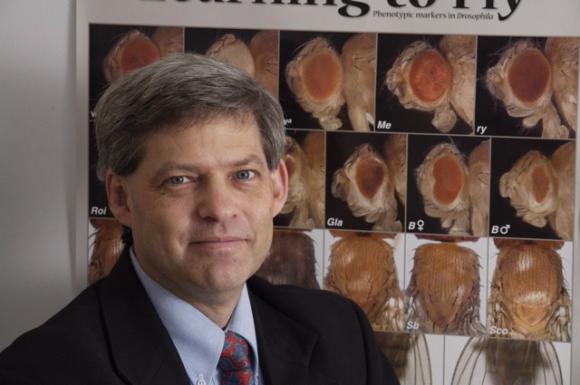Stephen Helfand, professor of biology, is one of a close-knit group of prominent Brown faculty working to discover exactly how our genes influence how long we live and how well we age. Recent work in many groups around the world indicates that we should be able to develop therapeutics to alter these mechanisms and improve not only longevity but, much more importantly, the quality of our lives during those years.
On Thursday, October 20, 2011, at 12:30, Helfand and colleagues at Brown and at the Lifespan hospitals will kick off a free monthly lecture series on the biology of aging at the Alpert Medical School’s new medical education building.
You sometimes talk about a “healthspan” rather than a “lifespan.” What does that mean?
The term “healthspan” emphasizes the goal of a healthy and longer life. The term “lifespan” does not explicitly include the quality of life and has sometimes been misinterpreted to imply that our research aims to extend life without paying attention to preserving the quality of life. This is largely the consequence of the experimental subjects we use in our studies. How would you judge the quality of life of a fruit fly? This may not be immediately obvious, and thus lifespan becomes a convenient experimental benchmark. But healthspan is our real goal, and this term emphasizes that maintenance of good health is ultimately the goal of our research. My colleagues John Sedivy and Qian Chen, who work with mice, can help us evaluate our research in this important light.
How do our genes and the chemical components of our bodies participate in the mechanisms that determine our aging? Don’t we just “break down” as we get older?
The idea that we just “break down” with age does not explain the incredible diversity of life we see around us — for example, the differences in lifespan between individuals or species with a similar level of activity. A mouse lives only two or three years, while a much more metabolically active hummingbird lives for nine years or more. Why doesn’t the hummingbird wear out faster than the mouse? Our research has identified specific biological mechanisms, modulated by genes and regulated by clearly identified molecular switches, that can not only modulate lifespan but also extend healthy life. In a series of remarkable experiments, single-gene alterations have dramatically extended lifespan while at the same time preserving health — in organisms as diverse as the nematode worm, the fruitfly, and the mouse. We clearly need to discover more about how these seemingly universal principles work.
What are some of the recent discoveries about the biology of aging that you find encouraging for application to health?
The clues we have discovered so far that affect aging implicate the regulation of our metabolism by known pathways such as insulin, as well as by a recently discovered family of proteins referred to as sirtuins. Manipulation of these networks by genetic as well as pharmacological means has shown dramatic improvements in both the lifespan and healthspan of experimental animals, including mice and primates. There has also been much interest and work on caloric restriction, an environmental intervention that has been known for some time to extend lifespan, and that is now beginning to be understood in molecular terms. The finding of drugs, such as resveratrol and rapamycin, that can extend healthy lifespan in many experimental animals, has led to a well-deserved explosion of interest in research on the biology of aging.
What’s going on in your lab right now?
With Professors Sedivy, Tatar, Reenan, and Neretti, we are exploring the molecular mechanisms of insulin signaling, sirtuins and calorie restriction, and identifying new targets for therapeutic intervention. We are also exploring completely new areas of research, such as the relationships between epigenetics, changes in our genomes that are acquired during our lifetimes but not inherited, and aging. There are many reasons to explore these directions, and it is currently a very exciting area of aging research. Using the most sophisticated new technologies of genome research, in combination with our classical experimental animal models, we are exploring how our genomes change with age. The ultimate goal is, of course, to apply this new knowledge to develop novel interventions for delaying the deleterious changes of aging.
Tell us about the new lecture series. What do you hope people will be able to take away from it?
This new seminar series will serve as a window into the recent remarkable findings that have propelled the field of aging to the forefront of biomedical research. Prominent scientists in the field, presenting their cutting edge research, will provide an opportunity for experiencing the excitement and promise of aging research. The seminar series will serve as a focal point for discussion and for engagement of more people in central topics of aging research. How do our adult bodies change with age? How are specific medical disorders related to, and affected by, the aging process? How can research on aging provide new and novel approaches to treating these disorders? And perhaps most importantly, how can we improve the health and well being of the aging segment of our populations? Dr. Gary Ruvkun of the Massachusetts General Hospital, who has won a Lasker prize and is a member of the National Academy of Sciences, will give the first talk next Thursday. He’ll speak about how systems normally important in detoxification may also play a major role in healthy aging.

